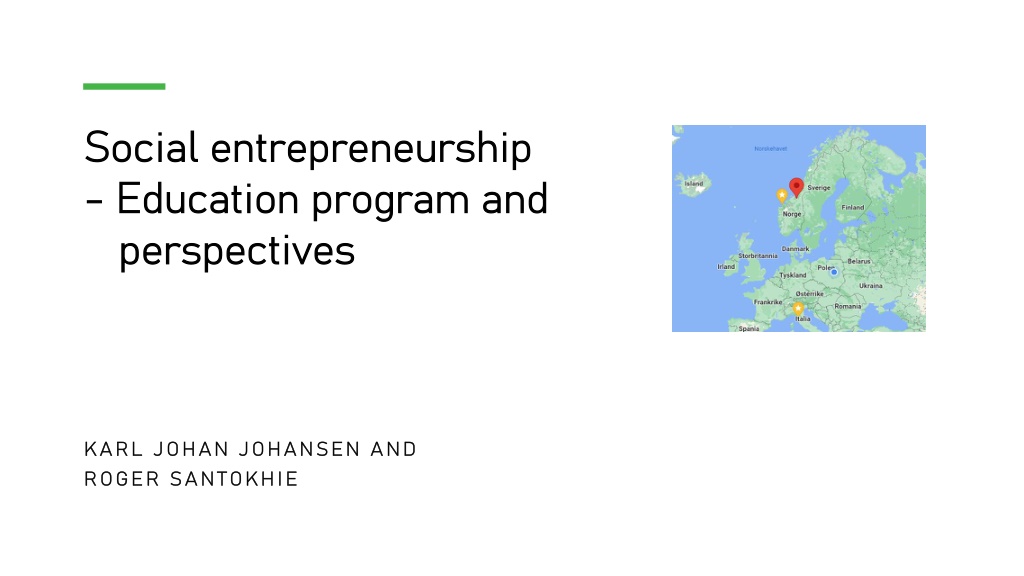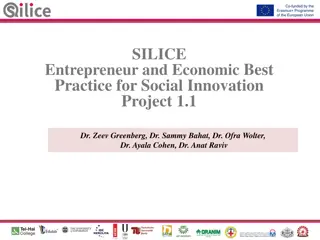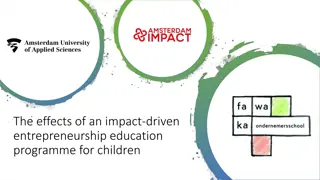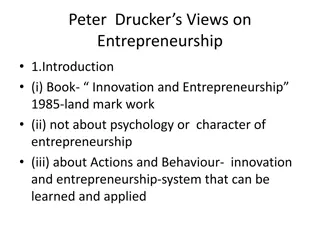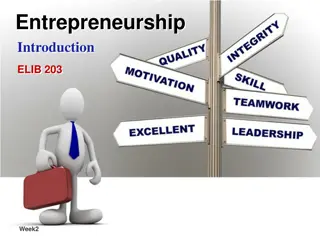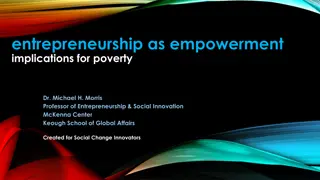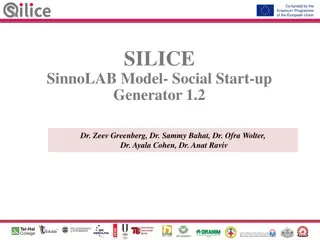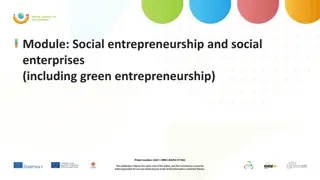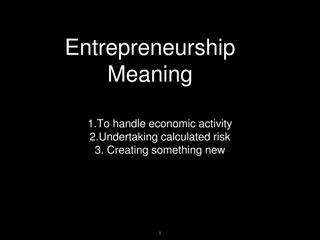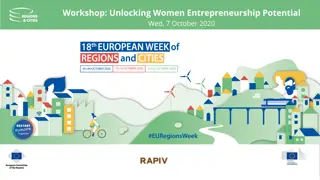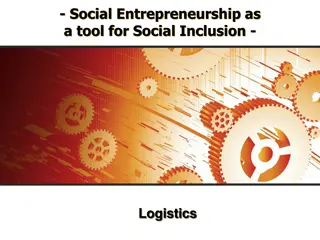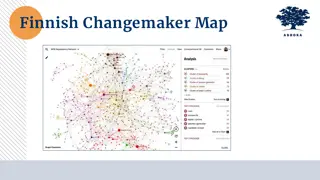Understanding Social Entrepreneurship in Education Programs
Explore the concepts of social entrepreneurship through vocational programs, definitions, types of social entrepreneurs, and business models focusing on social objectives. Gain insights into how social entrepreneurs work towards social change and make a positive impact on society.
Download Presentation

Please find below an Image/Link to download the presentation.
The content on the website is provided AS IS for your information and personal use only. It may not be sold, licensed, or shared on other websites without obtaining consent from the author. Download presentation by click this link. If you encounter any issues during the download, it is possible that the publisher has removed the file from their server.
E N D
Presentation Transcript
Social entrepreneurship Social entrepreneurship - - Education program and Education program and perspectives perspectives KARL JOHAN JOHANSEN AND KARL JOHAN JOHANSEN AND ROGER SANTOKHIE ROGER SANTOKHIE
Vocational program in Social Entrepreneurship Vocational means more practical training= 50% of the education is practice 3 theoretical topics about identy needs, professional work with different tools, organization, economy, ecosystem and barriers 2 practice periode of 12x2=24 weeks 60 university credits
Definition Definition of of a Social a Social entrepreneur entrepreneur A Social entrepreneur work for social change in the cracks and gaps that exist between the state, the market and the voluntary community. A social entrepreneur recognizes a social problem and uses tools from the business world to help solve this problem. Success in social entrepreneurship is not measured in profit, but in how big a positive impact the business has Cf. Nordic Council of Ministers, 2011: Creativity, innovation and entrepreneurship in the education systems in the Nordics have an impact on society.
Types Types of of social social entrepreneurs entrepreneurs
Four types of social entrepreneurs Four types of social entrepreneurs Type A: Business Type A: Business- -based activists Entrepreneurs who contribute to a common cause by selling products based activists Entrepreneurs who contribute to a common cause by selling products or services. or services. Type B: Social entrepreneurs Companies that do business with the aim of helping vulnerable groups. Type B: Social entrepreneurs Companies that do business with the aim of helping vulnerable groups. Type C: Innovative associations Professional public organizations that use new methods to meet social Type C: Innovative associations Professional public organizations that use new methods to meet social needs. needs. Type D: Innovative/entrepreneurial social workers Solve specific social needs in new ways. Funding is Type D: Innovative/entrepreneurial social workers Solve specific social needs in new ways. Funding is based on either public or private support, or supplier agreements based on either public or private support, or supplier agreements (Cf. Monday Morning 2010). (Cf. Monday Morning 2010).
Choice Choice of of business business model model Selected business models for The social entrepren r social entrepreneurship Business orientation Social objective Choice of business model Social enterprises Avgrensning
The relationship between the different sectors in The relationship between the different sectors in society society Triple Helix Triple Helix dimension/curve in space dimension/curve in space
Quadruple Quadruple Helix Helix Academia Private sector Public sector Voluntary sector
Ecosystem for social entrepreneurship Ecosystem for social entrepreneurship
Many industries and organizational forms Many industries and organizational forms Social entrepreneurial enterprises are spread over many fields and Social entrepreneurial enterprises are spread over many fields and they have different organizational forms and models. they have different organizational forms and models. In relation to the usual statistical division of the business world, In relation to the usual statistical division of the business world, social entrepreneurs appear as a fragmented group social entrepreneurs appear as a fragmented group. (Kobro 2017, p. 33) Company, NGO, Cooperative, Foundation, Hybrid,
Barriers Barriers Research shows that: There are a number of barriers and difficulties that seem to be obstacles to the growth of social entrepreneurship in the Norwegian welfare state; structural, legal and financial conditions, but also attitudinal/cultural conditions. Findings also point to the social entrepreneurs themselves, that social entrepreneurs often have a little too simple and naive ideas about how social challenges can be solved. (https://openarchive.usn.no/usn-xmlui/handle/11250/2463099)
In practice, dual competence is required In practice, dual competence is required The entrepreneurial process is about discovering and exploiting a set of dual opportunities both commercial and social. Often it requires participation in networks/environments where the competence the social entrepreneur himself does not have is available. Social capital is important
Mixed collaboration processes Mixed collaboration processes Social entrepreneurs are often involved in Co Co- -creation creation - - Co Co- -production production Logic, skills and competence from the private sector combined with volunteerism/idealism, life experiences in the field of social practice, Law, economics and politics are mixed together in creative and constructive processes, with new and useful solutions as. Social value is created in both process and result. Dignity, respect, empowerment and meaning are social values that emerge in the process
The development process step by step The development process step by step
Power Power Powerfarm farm - Outdoor therapi Someone AS Someone Someone AS AS - dementia care Examples of social Examples of social entrepreneurship entrepreneurship Anthill Anthill Anthill - Social Care More taste More taste More taste - Social integrasjon Outdoor academy Outdoor academy Outdoor academy Nature Knowlegde Heidi hiker Heidi Heidi hiker hiker - Outdoor terapi Fellow Hikers Fellow Hikers Fellow Hikers Mental support Deep Roots Deep Roots Deep Roots Green production/integration
